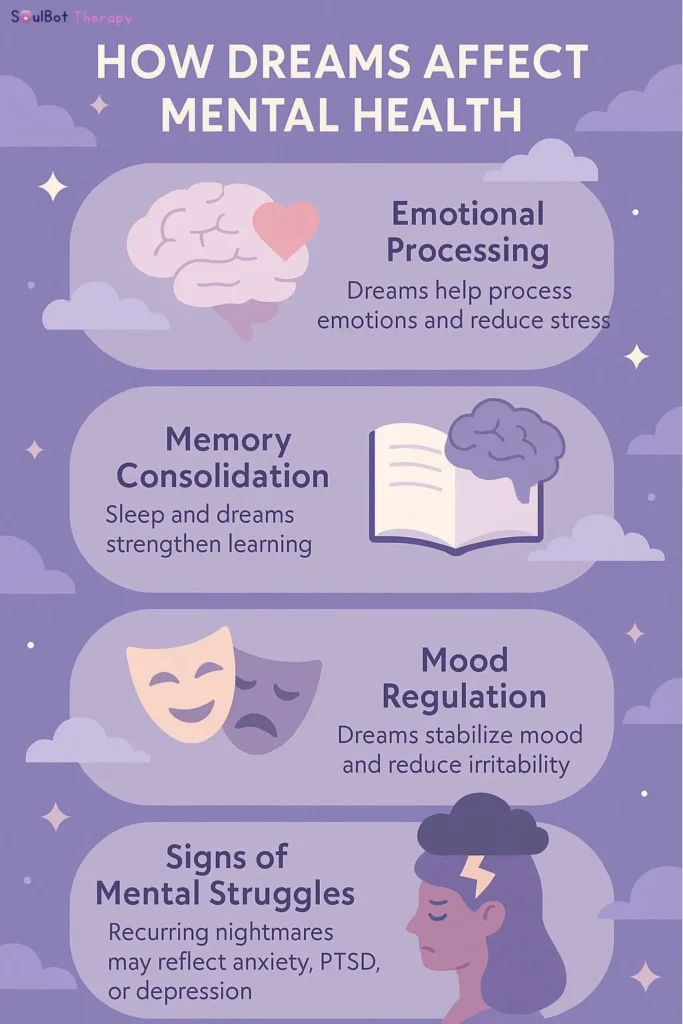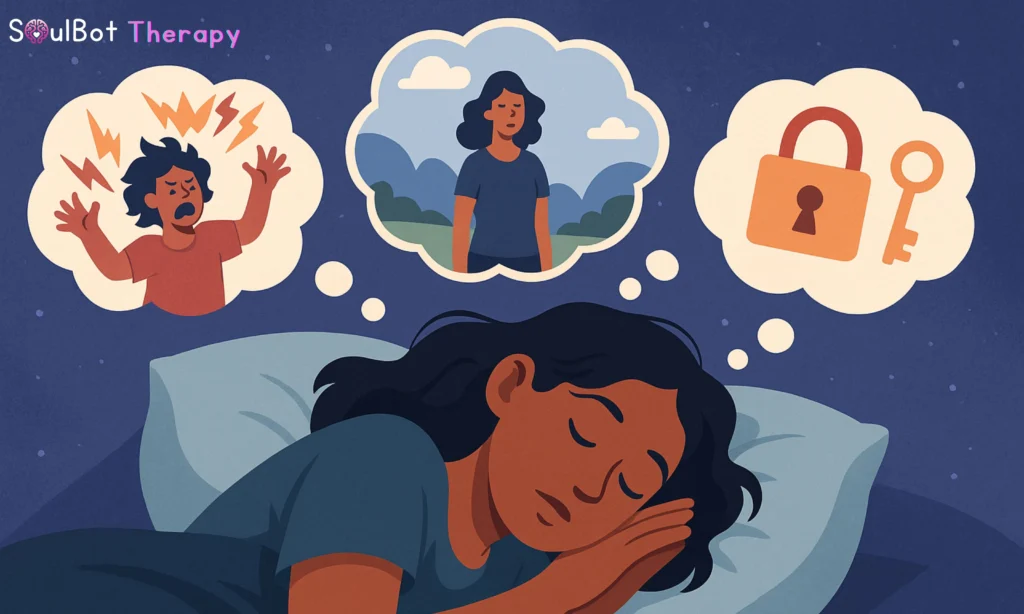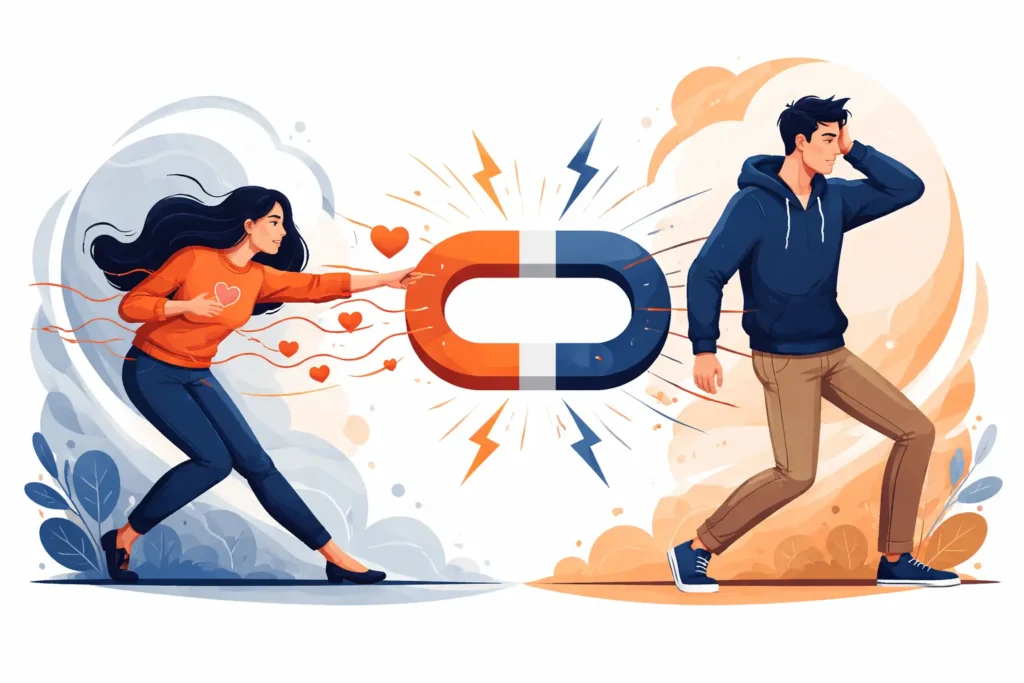Dreams fascinate us because they blur the line between fantasy and reality. Psychologists have long explored the psychology of dreams, asking: Do our dreams reflect hidden fears, stress, or subconscious desires? While not every dream has a neat meaning, many mirror your mental state, emotional struggles, and daily stress.
Let’s unpack how dream psychology works, common dream themes, and what your subconscious tries to tell you.
👉 Having recurring dreams? Take our Sleep Quality Assessment to understand what your subconscious may tell you.What Does the Psychology of Dreams Say?
Dreams occur during REM (Rapid Eye Movement) sleep, a stage critical for memory and emotional regulation. The psychology of dreams means they serve several functions:
- Supporting the brain process of unresolved feelings.
- Consolidating memory and problem-solving.
- Providing symbolic “practice” for real-life challenges.
Freud believed dreams were hidden wish fulfillment, while Jung saw them as messages from the subconscious mind. Today, neuroscience views them as emotional regulation tools, your brain’s way of clearing out stress and clutter.
💡 SoulFact: The American Psychological Association notes that dreams help relieve emotional distress by replaying stressful experiences in symbolic, less threatening forms.
Do Dreams Reflect Mental Health and Emotional State?
Yes. Many studies show strong links between mental health and dreams. For example:
- Anxiety often triggers repetitive or disturbing dream patterns.
- Depression is linked to more negative dream content and less REM sleep.
- Stress tends to make dreams more vivid and emotionally intense.
This makes dreams a mirror of your psychological well-being rather than random nightly movies.
What Are the Most Common Anxiety Dreams and Their Meanings?
Some dreams have patterns that psychologists call “anxiety dreams.” While they shouldn’t be taken literally, they often reveal underlying emotional concerns.
- Falling: Feeling out of control.
- Being chased: Avoiding conflict or unresolved fear.
- Teeth falling out: Insecurity or fear of judgment.
- Exams or unpreparedness: Fear of failure or self-doubt.
- Being late: Anxiety about responsibilities or missed opportunities.
🔗 External Insight: Research confirms that high stress increases anxiety, dream meaning frequency, linking daily emotional states with nighttime imagery.

What Is Dream Interpretation Psychology?
Dream interpretation isn’t fortune-telling; it’s a psychological tool. Dream interpretation psychology helps uncover subconscious fears or wishes by exploring emotions, symbols, and context.
For example:
- A dream about losing something might reflect fear of loss or change.
- A flying dream could symbolize freedom or escaping limits.
The goal isn’t to decode every detail but to understand how dreams connect to your feelings.
How Stress and the Subconscious Shape Dreams
Stress is one of the biggest influences on dreaming. Elevated cortisol and nervous system activity spill into sleep, producing more vivid or negative dreams.
This shows how the subconscious mind and dreams work together. Your brain uses dream space to process the fears you don’t fully face while awake.
💡 SoulFact: Studies on REM sleep reveal that people deprived of it show increased emotional reactivity, proving that dream cycles are essential for emotional stability.
Can Dreams Be Used for Emotional Healing?
Yes. While you shouldn’t rely only on dreams for mental health insights, journaling them can help:
- Spot emotional triggers.
- Reflect on recurring fears.
- Identify secret desires or unresolved stress.
Therapists sometimes use dream exploration as part of treatment, especially for trauma or anxiety.
Conclusion: Dreams as a Mental Mirror
The psychology of dreams proves that our nighttime stories are more than random brain noise. They symbolize stress, emotional struggles, and subconscious thoughts. While not every dream has deep meaning, paying attention to them can reveal what your mental state needs—whether it’s rest, healing, or emotional release.
👉 Want deeper insights? Chat with SoulBot, your AI mental health guide, to explore dream psychology and emotional balance.







